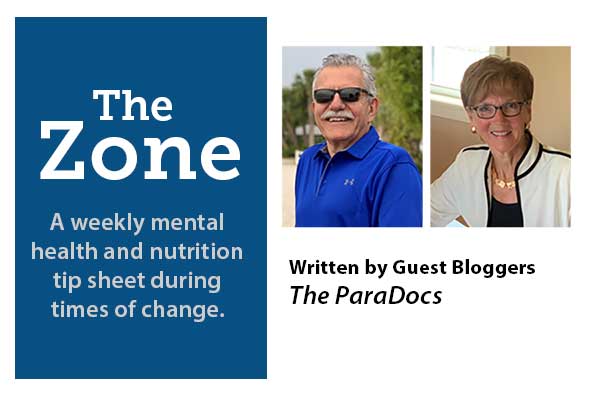Establishing a self-care regimen is vital for personal growth and maintenance in these challenging times.
In Volume 49 of this guest series, psychotherapist Dr. Francis L. Battisti and nutritionist Dr. Helen Battisti teach us the 5 steps that we can follow to take optimal care of ourselves.
For over 10 years, they have worked closely with us on aging concerns and have presented many webinars and in-person workshops. Their newsletter, The Zone, is a weekly mental health and nutrition tip sheet during times of change.
As a follow-up to last week’s discussion, we are reviewing some of the various approaches to self-care and the research that is the foundation for these theories. Understanding the research that informs the approaches is recommended as we decide our self-care regimen. It informs us as to what approaches work best for desired change, fills in gaps in knowledge and may change the way that we have worked in the past.
Learning how to assess information, and know that we can trust it, involves a minimum of five basic steps. Using these steps can help us feel more confident in including the information into our self-care practice. The first step is to ask, who is conducting the research, and do they have the required qualifications? The second step is to determine if the research has been conducted on humans or only animals. The third step is to ask, who is funding the research? The fourth step is to learn how many people participated in the study. The fifth step is to determine if the research has been repeated and has it been peer-reviewed.
Some of the research and approaches, but certainly not all, that we have found to be trustworthy include:
The Blue Zones – “The concept of blue zones grew out of the demographic work done by Gianni Pes and Michel Poulain outlined in the Journal of Experimental Gerontology, identifying Sardinia as the region of the world with the highest concentration of male centenarians. Pes and Poulain drew concentric blue circles on the map highlighting these villages of extreme longevity and began to refer to this area inside the circle as the blue zone. Building on that demographic work, Dan pinpointed other longevity hotspots around the world and dubbed them blue zones: Okinawa, Japan; Sardinia, Italy; Nicoya, Costa Rica; Ikaria, Greece, and Loma Linda, California.”
The works of Dr. Kenneth Cooper – “Dr. Kenneth H. Cooper, former Air Force Colonel, preventive medicine pioneer and “father of aerobics,” introduced the concept of exercising in pursuit of good health when he launched the world-wide phenomenon Aerobics in 1968—his first of 19 books on health and fitness.”
The works of Dr. Andrew Weil – “Dr. Weil, has devoted the past 30 years to developing, teaching, and educating others on the principles of integrative medicine. Weil is an internationally recognized expert on integrative medicine, medicinal herbs and mind-body interactions. The founder of Weil Lifestyle, LLC, a leading resource for integrative medicine education, information, products, and services, Weil combines a Harvard education and a lifetime of practicing integrative medicine to provide a unique approach to health care which encompasses body, mind, and spirit.”
The works of Dr. Wayne Dyer – “Dr. Dyer was an internationally renowned author and speaker in the fields of self-development and spiritual growth. Over the four decades of his career, he wrote more than 40 books, including 21 New York Times bestsellers. He created many audio and video programs and appeared on thousands of television and radio shows.”
Positive Psychology – “Positive psychology is a branch of psychology focused on the character strengths and behaviors that allow individuals to build a life of meaning and purpose—to move beyond surviving to flourishing. Theorists and researchers in the field have sought to identify the elements of a good life. They have also proposed and tested practices for improving life satisfaction and well-being.”
ChooseMyPlate – “ChooseMyPlate.gov is your access point to USDA’s guidance on food and nutrition and is updated and managed by the USDA Center for Nutrition Policy and Promotion. This website help’s users find what they need quickly and easily.”
Omega Women’s Leadership Center – “This Center offers an integrated approach to personal growth, leadership development, and social change. Whether you are a seasoned leader or beginning your leadership voyage, our programs are designed for all who identify as women to strengthen their leadership so that we can help create a world that works – for everybody.” While we are familiar with these approaches, it is important for each of us to explore and determine for ourselves what fits our present and future needs.”
Key Takeaways
- There are many approaches and practices to include in your self-care practice.
- Reviewing and assessing the research that builds the various practices are important for intentional self-care.
- There are specific steps to take in reviewing research.
- Seek your own review of various self-care practices.
- Read and review published self-care research journals.
- Knowing that self-care is not a fad.
- Trying the newest self-care practice before reviewing its safety and quality.
- Believing that everything on the internet is reviewed and studied.
- Waiting to see what all your friends are doing for self-care.
In summary, when thinking about spiritual, psychological and physical self-care practices that you may want to participate in, it is important to review the research that demonstrates their efficacy. In doing this, we are saying that our health is important and that we are going to take it seriously. What we do today, will impact the quality of our future years.
Quote of the Week
“When you recover or discover something that nourishes your soul and brings joy, care enough about yourself to make room for it in your life.”
-Jean Shinoda Bolen

